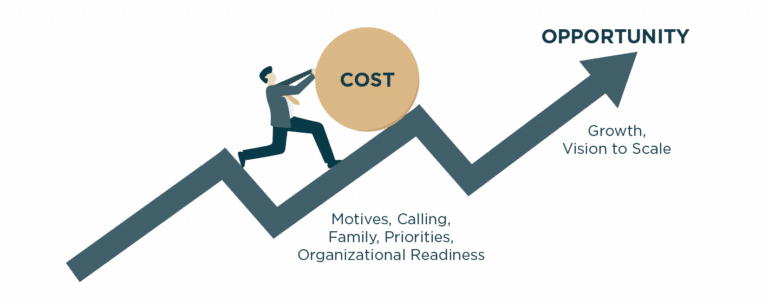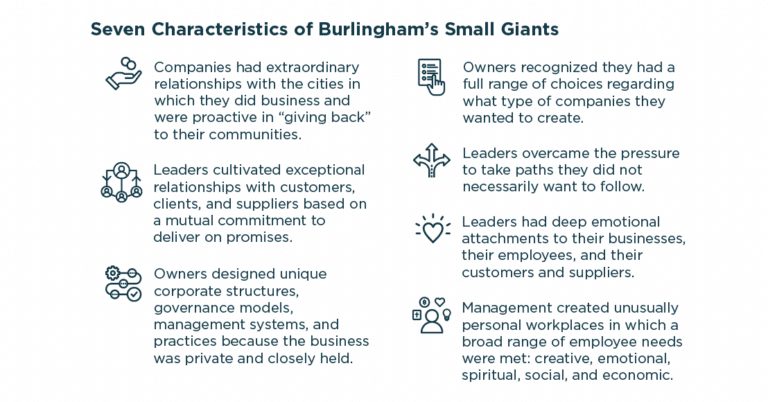Six Steps to Sustainable Business Scaling
How to Pursue Healthy Business Growth with Intentionality and Impact
In the business world, growth often stands as the ultimate measure of success. Leaders strive to build profitable companies, deliver outstanding products or services, and increase revenue. Metrics like “bigger” and “better” dominate the narrative. But is bigger always better? Can exponential growth be sustained in the long run? And what are the costs of growth—for you as a leader, for your team, and for your family?

The real question is: How do you scale a business in a sustainable way? Business growth is an exciting opportunity, but it requires thoughtful planning and intentional execution. Wise leaders understand the importance of weighing the costs before pursuing growth to ensure that their success does not come at too high a price. This article outlines six essential steps to help you scale your business in a way that is both healthy and sustainable.
Laying the Groundwork: Are You Ready to Grow?
Before you move forward with scaling, it is crucial to take a step back and evaluate whether the timing, resources, and strategy are right. Start by asking yourself these critical questions:
- What is driving this decision? Are you motivated by market opportunity, customer demand, or internal pressures? Understanding your “why” ensures clarity and purpose in your growth strategy.
- Are you focusing on areas where you excel, or are you stretching too thin? Sustainable growth requires honing in on your strengths. Expanding into unfamiliar territory without the right expertise can strain resources and compromise quality.
- Do you have the resources, skills, and capacity to sustain growth? Scaling successfully demands not just financial investment but also operational readiness and skilled leadership. If gaps exist, consider where you may need external support, skill training, additional staff, or process improvements.
Growth without preparation can lead to burnout, inefficiency, and diminished results. Taking the time to assess these factors upfront ensures that your business scales in a way that is intentional, impactful, and in line with where you feel God is leading you.
For a comprehensive guide to discerning these decisions, download our free resource, Scaling with Purpose: A Reflection Guide for Intentional Growth. This tool is designed to help you evaluate your readiness for growth, clarify your goals, and build a solid foundation for sustainable expansion.
Six Steps to Sustainable Scaling
Scaling your business is an exciting opportunity, and it requires intentional strategies to ensure long-term success. By focusing on these six foundational elements of growth—your team, values, systems, pace, scope, and financing—you can set the stage for sustainable and impactful expansion.
1. Hire a High-Performing Team: Building a team of top-tier talent is essential for scaling. High performers can significantly impact productivity—Scott Keller of McKinsey & Company notes they are 400% more effective than average employees. Resist the urge to fill positions quickly. Instead, focus on hiring individuals who bring exceptional skills and align with your company’s values. Additionally, evaluate what roles will be necessary for sustainable growth and identify opportunities for development within your existing team.
2. Establish Shared Values: As your business grows, its culture must shift from being personality-driven to value-driven. Shared organizational values guide decision-making, processes, and team dynamics. They create cohesion and resilience, ensuring that the business can thrive even as it expands.
3. Scale Systems and Processes: Robust systems and processes are critical for supporting sustainable growth. Delegate decision-making to trusted leaders, and provide thorough onboarding for new employees. Evaluate your current systems to identify manual tasks that can be automated and ensure your infrastructure can handle increased demands. Strong systems create a reliable foundation for future growth.
4. Watch Your Speed: Growing too quickly can lead to overextension, staff burnout, and poor decision-making. Evaluate how fast your business can grow without sacrificing quality, culture, or financial stability. Sustainable growth requires balancing ambition with careful planning.
5. Determine Your Scope: Growth does not need to happen everywhere at once. Identify the areas most ready for expansion, whether that is geographically, through new product lines, or by enhancing existing services. Focused efforts allow you to scale strategically while staying aligned with your long-term vision.
6. Secure Adequate Financing: Scaling requires resources. Whether it is hiring top talent, upgrading technology, or refining processes, growth comes with costs. Assess whether financing is necessary and carefully consider the implications of taking on debt. Wherever possible, identify areas to streamline expenses and reinvest in sustainable growth.
By applying these six steps, you can approach growth with confidence, ensuring your business expands in a way that is strategic, sustainable, and aligned with your long-term goals.
Rethinking Growth: Is Bigger Always Better?
In Small Giants, Bo Burlingham studied 14 companies that rejected the pressure for endless growth, instead prioritizing meaningful goals. These included excelling at their craft, creating healthy workplaces, caring deeply for customers, and serving their communities. These leaders understood that true success is about intention, not just expansion.

Their stories remind us that success is not one-size-fits-all. The question is not just, “How do we grow?” but also, “Should we grow?” Sustainable scaling requires aligning growth with your mission and making decisions that support long-term health and impact. Sometimes, the boldest move is not growing bigger—it is growing better.
A Journey to Sustainable Scaling
In 2011, Alex Melvin stepped into the leadership of Rural King, a third-generation family-owned business. Under his direction, the company expanded to 135 stores, employed over 8,000 people, and surpassed $1 billion in annual sales. By all worldly measures, Alex had achieved remarkable success. But in 2018, everything changed. Despite his accomplishments, Alex felt the weight of emptiness that often accompanies material success. It was during this season of questioning and searching that God captured his heart, transforming not only his life but the purpose and vision of his business.
Alex’s story is a powerful reminder that true success is not measured by numbers on a balance sheet but by the Kingdom impact you make when you steward your business for God’s glory.
The Impact of Intentional Growth: A Balanced Approach
Successful scaling is not about being the biggest; it is about building a business that thrives while honoring the people and principles that matter most. The right size for your business is one that allows you to achieve your goals, serve your customers well, and maintain balance in your personal and professional life. Growth should always be purposeful, sustainable, and aligned with your God-given, greater purpose. By focusing on sound business practices, clear priorities, and thoughtful decision-making, you can create a company that not only grows but also leaves a lasting impact.
C12 Business Forums provides an architected environment for Christian business leaders that integrates work, life, and leadership transformation. To learn more about C12’s approach to Christ-centered business leadership, find a C12 Business Forum near you.
February 17, 2025






